Sustainability cannot be achieved through shortcuts. However, construction companies that are genuinely embedding sustainable practices into their business and communicating them effectively are seeing long-term benefits
Sustainability is undoubtedly one of the most critical conversations in the construction industry today. According to a World Economic Forum survey, 90% of executives believe sustainability is important to their brand.
Additionally, a Morgan Stanley report indicates that 77% of global investors are keen to support companies with positive social and environmental impact.
For end-customers, sustainability is now a top priority, with over a third of consumers willing to pay more for eco-friendly solutions. In response, the construction industry is now filled with sustainability rhetoric, but therein lies the challenge.
From buzzword to white noise
Sustainability, while essential, has ceased to be a true differentiator. It has become a box-ticking exercise for many companies, resulting in what some describe as “greenwashing” – making superficial or misleading claims about being eco-friendly.
As buyers become more knowledgeable, these hollow claims are being called out and a new phenomenon, “greenhushing,” has emerged. Some companies are now hesitant to publicise their sustainability efforts for fear of scrutiny.
However, those who are genuinely embedding sustainability into their business practices and communicating it effectively are seeing long-term brand benefits. These companies understand that sustainability must go beyond mere words to offer a real competitive edge.
Embedding sustainability — and the cost involved
Sustainability cannot be achieved through shortcuts. It requires businesses to rethink their operations and articulate their sustainable practices in a way that resonates with their audience.
Consider a drainage and access product manufacturer that transitioned to using recycled polypropylene for its products. This shift not only made its products lighter and more fuel-efficient to transport but also demonstrated a strong commitment to sustainability in a traditional sector.
Similarly, a flooring manufacturer client switched to using organic ingredients like rapeseed oil in its product range, earning prestigious sustainability accreditations such as Cradle 2 Cradle.
These companies differentiate themselves by demonstrating tangible actions rather than simply making empty claims.
However, this approach does involve an initial cost. But in the long run, sustainable practices often lead to reduced costs and increased profitability, while also attracting top talent.
For construction specifiers aiming to choose sustainable products, discussions about costs with contractors and clients often become a sticking point. So, how can these conversations be shifted away from cost alone?
Moving the conversation beyond cost
This is the focus of the upcoming Specifier Summit, which will take place on 7 November.
The event, entitled Sustainability – At What Cost?, will bring together 150 specifiers to discuss the role of sustainability in the current economic climate.
With contributions from Sir Jonathon Porritt and exhibitors showcasing cutting-edge sustainable materials and methods, the event aims to foster pragmatic discussions about making sustainability a core brand value, beyond just financial considerations.
Sustainability is being reinforced by ever tightening legislation and when companies cannot compete on price, they often find themselves competing on compliance. Those that do not participate in this conversation risk being left behind.
To book your tickets to attend this seminal event for sustainability in the construction industry, click here, and learn what sustainability in construction truly means today, what it absolutely isn’t, and how it must urgently evolve beyond the merely financial to serve all our tomorrows.
*Please note that this is a commercial profile.
The post Sustainability in construction: Beyond the buzzwords appeared first on Planning, Building & Construction Today.


